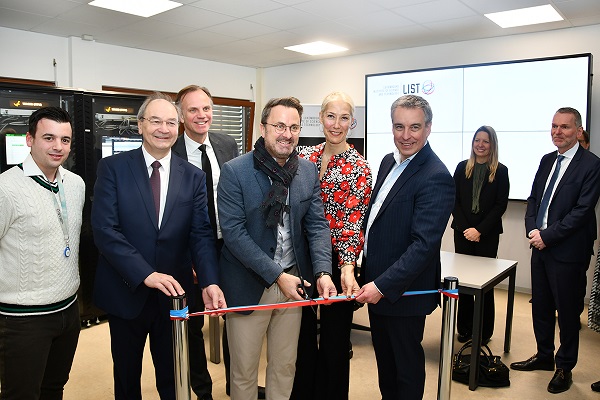 Prime Minister Xavier Bettel; Minister for Research, Claude Meisch, inaugurating the new LIST lab;
Credit: LIST
Prime Minister Xavier Bettel; Minister for Research, Claude Meisch, inaugurating the new LIST lab;
Credit: LIST
On Thursday 2 March 2023, the Luxembourg Institute of Science and Technology (LIST) inaugurated a new laboratory to enable the operations of complex smart energy systems to be optimised, such as production on an agri-photovoltaic farm in Kehlen.
Luxembourg's Prime Minister, Xavier Bettel, and the Minister for Research, Claude Meisch, were welcomed by Eva Kremer, Chairwoman of the LIST Board of Directors, and Thomas Kallstenius, CEO, before inaugurating the new real-time power-in-the-loop simulation laboratory. This state-of-the-art facility opens up many collaboration possibilities in the field of smart grids.
In this lab, different types of grids can be simulated virtually in real-time and made smart. The lab can evaluate the interaction of any generic physical system (mechanisms, reactors, sensors, etc.) with any generic virtual environment (operating scenarios, virtual test benches, disturbances, etc.). It allows remote interactions - up to several thousand km - between an existing physical system, such as an electricity distribution network, and a virtual system simulated in real-time on a computer in Luxembourg. The aim is therefore to use the virtual system model to evaluate performance, carry out tests and improve or even complete a real physical system. The infrastructure also makes it possible to communicate remotely with hardware to parameterise it right from the manufacturing stage, in order to optimise the system.
In concrete terms, the Intelligent Clean Energy Systems unit at LIST uses this laboratory to study real-time phenomena in electrical systems, such as the response of the network to lightning strikes or the behaviour of photovoltaic panels in windy and cloudy conditions. Pedro Rodriguez, head of the Intelligent Clean Energy Systems unit, and his team are currently working on a project aiming for the smart operation of an agri-photovoltaic farm in Kehlen, which will produce hydrogen by means of electrolysers using energy from photovoltaic panels and large-scale batteries. This energy will be used both for sustainable mobility and to improve the production of a local biogas plant.
Part of the nationwide digital twin
After modelling, simulating and testing the system, the researchers are now remotely setting up a large-scale battery built in Spain. Custom-made to meet the specific needs of the farm, this battery will be tested further at LIST before being deployed in Kehlen. Once installed, it will remain in real-time contact with the laboratory's machines, which will be able to set its parameters or control it remotely, according to sunshine forecasts, for example. The aim is also to optimise the region's electricity network, which is managed by CREOS.
After inaugurating the laboratory, Xavier Bettel and Claude Meisch then discovered how the LIST Viswall can interact with the laboratory data and represent it in a more tangible way as part of the energy component of the nationwide digital twin. The real-time power-in-the-loop simulation laboratory is proving to be a great asset for Luxembourg, enabling the smart and modern management of energy storage and distribution at a time when many consumers are becoming prosumers.








